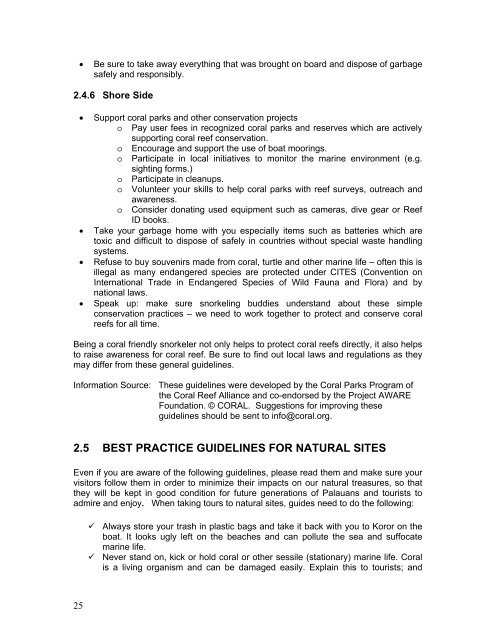KOROR STATE GOVERNMENT MARINE TOUR GUIDE ... - C3
KOROR STATE GOVERNMENT MARINE TOUR GUIDE ... - C3
KOROR STATE GOVERNMENT MARINE TOUR GUIDE ... - C3
You also want an ePaper? Increase the reach of your titles
YUMPU automatically turns print PDFs into web optimized ePapers that Google loves.
• Be sure to take away everything that was brought on board and dispose of garbage<br />
safely and responsibly.<br />
2.4.6 Shore Side<br />
• Support coral parks and other conservation projects<br />
o Pay user fees in recognized coral parks and reserves which are actively<br />
supporting coral reef conservation.<br />
o Encourage and support the use of boat moorings.<br />
o Participate in local initiatives to monitor the marine environment (e.g.<br />
sighting forms.)<br />
o Participate in cleanups.<br />
o Volunteer your skills to help coral parks with reef surveys, outreach and<br />
awareness.<br />
o Consider donating used equipment such as cameras, dive gear or Reef<br />
ID books.<br />
• Take your garbage home with you especially items such as batteries which are<br />
toxic and difficult to dispose of safely in countries without special waste handling<br />
systems.<br />
• Refuse to buy souvenirs made from coral, turtle and other marine life – often this is<br />
illegal as many endangered species are protected under CITES (Convention on<br />
International Trade in Endangered Species of Wild Fauna and Flora) and by<br />
national laws.<br />
• Speak up: make sure snorkeling buddies understand about these simple<br />
conservation practices – we need to work together to protect and conserve coral<br />
reefs for all time.<br />
Being a coral friendly snorkeler not only helps to protect coral reefs directly, it also helps<br />
to raise awareness for coral reef. Be sure to find out local laws and regulations as they<br />
may differ from these general guidelines.<br />
Information Source: These guidelines were developed by the Coral Parks Program of<br />
the Coral Reef Alliance and co-endorsed by the Project AWARE<br />
Foundation. © CORAL. Suggestions for improving these<br />
guidelines should be sent to info@coral.org.<br />
2.5 BEST PRACTICE <strong>GUIDE</strong>LINES FOR NATURAL SITES<br />
Even if you are aware of the following guidelines, please read them and make sure your<br />
visitors follow them in order to minimize their impacts on our natural treasures, so that<br />
they will be kept in good condition for future generations of Palauans and tourists to<br />
admire and enjoy. When taking tours to natural sites, guides need to do the following:<br />
Always store your trash in plastic bags and take it back with you to Koror on the<br />
boat. It looks ugly left on the beaches and can pollute the sea and suffocate<br />
marine life.<br />
Never stand on, kick or hold coral or other sessile (stationary) marine life. Coral<br />
is a living organism and can be damaged easily. Explain this to tourists; and<br />
25











